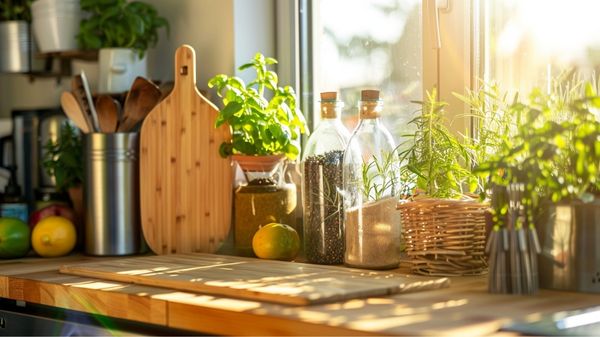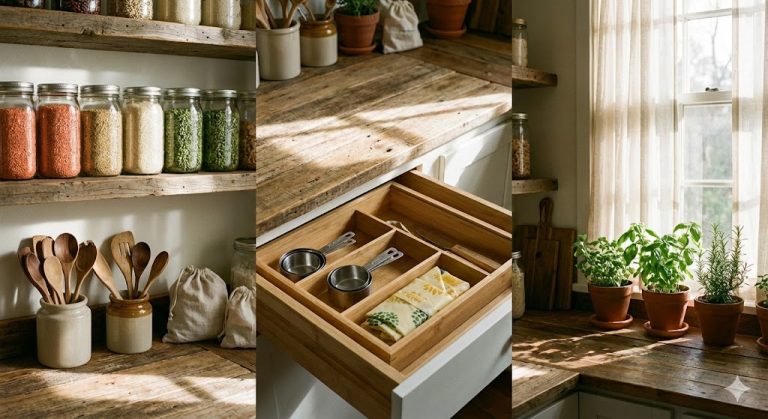To enhance sustainability, consider integrating the following ten eco-friendly products for your home: reusable rolled unpaper towels that reduce waste, energy-efficient appliances featuring Energy Star certification to minimize energy consumption, and natural cleaning products that utilize biodegradable formulations.
Sustainable kitchen solutions, biodegradable plant containers, and eco-conscious homeware choices further support environmental goals. Additionally, prioritize organic personal care items and eco-friendly home décor manufactured from reclaimed or sustainably sourced materials.
Incorporating these items not only mitigates environmental impact but also promotes a healthier lifestyle. As you explore these options, you’ll discover additional strategies to optimize your eco-friendly efforts.
Reusable Rolled Unpaper Towels
When it comes to eco-friendly alternatives in your home, reusable rolled unpaper towels stand out as a smart choice. These towels not only enhance your kitchen organization but also serve multiple sustainability benefits, making you feel a part of a larger movement towards responsible living.
By reducing waste associated with single-use paper towels, you dramatically decrease your environmental footprint. Crafted from durable materials such as cotton or bamboo, these towels boast impressive absorbency and longevity, allowing for extensive reuse—up to ten years with proper care.
Additionally, they are made from eco-friendly materials that align with zero-waste lifestyle principles. Composting organic waste plays a vital role in reducing landfill waste, which is directly related to the waste reduction benefits of using unpaper towels.
Moreover, choosing unpaper towels helps to conserve natural resources, mitigates carbon emissions, and aligns with the essential principle of circularity, promoting a sustainable lifestyle that benefits everyone.
You can effortlessly integrate them into your daily chores, using them on standard paper towel holders for quick access, while sharing this eco-conscious choice with guests encourages collective responsibility.
Sustainable Kitchen Solutions
Integrating eco-friendly products like reusable rolled unpaper towels is just the beginning of creating a sustainable kitchen. You can enhance your culinary space with sustainable cookware, which not only promotes healthier cooking methods but also supports environmental responsibility.
Look for Energy Star labeled appliances, as these meet stringent energy efficiency guidelines, ensuring you’re minimizing energy consumption. Additionally, using energy-efficient appliances allows you to save on utility costs while reducing your carbon footprint.
Consider installing low-flow faucets and water-efficient dishwashers, which allow you to practice water conservation effectively, creating a zero waste meal prep environment. Opting for countertops made from recycled materials or using chipboard cabinets from wood waste can greatly reduce your kitchen’s ecological footprint.
Incorporate natural lighting through large windows or skylights, which lessens your dependence on artificial light, thereby fostering a more vibrant atmosphere while saving energy. Investing in smart kitchen devices enhances energy efficiency and enables you to monitor and adjust your consumption patterns.
By embracing these sustainable kitchen solutions, you’ll not only create a practical and welcoming space but also join a community of individuals committed to fostering a healthier planet. Your efforts contribute to meaningful change for both you and future generations.
| # | Preview | Product | Rating | Price | |
|---|---|---|---|---|---|
| 1 |
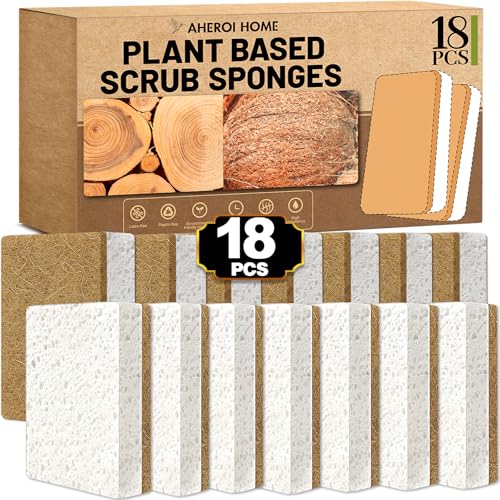
|
Aheroi Natural Dish Sponge, 18 Count FSC Certified Plant-Based Biodegradable Kitchen Sponges for... |
$7.18 |
Buy on Amazon | |
| 2 |
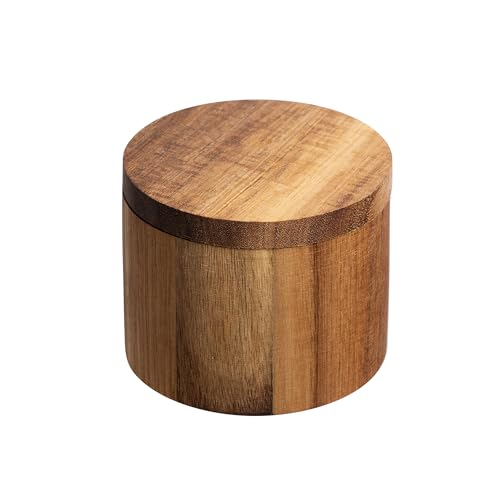
|
BFU Hxin Kitchen Salt Cellar Container |
$9.99 |
Buy on Amazon |
Eco-Friendly Home Decor
Eco-friendly home decor not only enhances your living space but also reflects your commitment to sustainability. By incorporating eco-friendly textiles and sustainable furniture into your home, you create a warm and inviting environment while minimizing your ecological footprint.
For instance, choose organic cotton textiles that are chemical-free and sourced sustainably—these not only offer comfort but also contribute positively to the environment.
Additionally, opt for sustainable furniture made from materials like reclaimed wood or bamboo, which are both renewable and require less energy to produce compared to conventional options.
Rattan, another excellent choice, is fast-growing and recyclable, making it a guilt-free addition to any room. Many brands, such as LIKHÂ and Village Thrive, engage with artisan communities to ensure they are fairly compensated for their work, promoting social responsibility and creating beautiful handcrafted goods.
Look for brands like Ten Thousand Villages and The Citizenry, which prioritize fair trade practices and support local artisans. The use of upcycled materials, such as reforested wood offcuts, exemplifies creativity while markedly reducing waste.
| # | Preview | Product | Rating | Price | |
|---|---|---|---|---|---|
| 1 |

|
MAKING UPCYCLED FURNITURE FOR BEGINNERS: A Comprehensive Guide To Creative Upcycling Techniques,... |
$9.85 |
Buy on Amazon | |
| 2 |
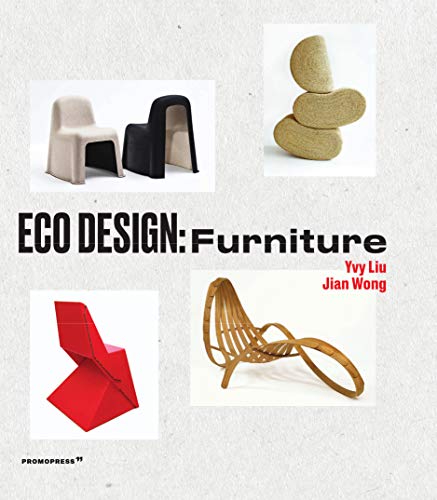
|
Eco Design: Furniture |
$19.99
$18.65 |
Buy on Amazon |
Organic Personal Care Items
Organic personal care items offer a natural alternative to conventional products, allowing you to nurture your skin without harmful chemicals. By choosing organic skincare and natural haircare, you’re making a conscious choice for both your health and the environment. Eco-friendly insulation materials can even contribute to a holistic lifestyle by promoting overall wellness.
Brands like California Pure Naturals provide skincare products that are at least 70% organic and 100% vegan, prioritizing environmentally-friendly beauty products and practices.
For those who want assured safety and quality, look for USDA certified organic products, like those offered by Organic Essence, which showcase compostable packaging and zero waste. These items are free from harsh chemicals, including artificial preservatives, sulfates, and parabens, ensuring that you receive a gentler, more effective skincare experience.
In addition to skincare, natural haircare products feature organic fruits and herbs, supporting sustainable agriculture while being 100% vegan and gluten-free. From shampoos to baby care formulations, the diverse product range is designed to cater to various needs, making it easier for you to adopt a holistic, eco-friendly personal care routine.
Embracing these organic options connects you to a community that values ethical consumption and wellness for both individuals and the planet.
Energy-Efficient Appliances
Your home can greatly benefit from energy-efficient appliances, which not only reduce your electricity bills but also lessen your environmental impact. By choosing appliances with high appliance efficiency ratings, such as Energy Star certified refrigerators and dishwashers, you can save at least $50 annually on energy costs.
For instance, new Energy Star refrigerators consume approximately 15% less energy compared to their non-certified counterparts. Additionally, models designed with top-freezer and bottom-freezer designs are more efficient than side-by-sides and French-doors.
Moreover, the advanced technologies incorporated into these appliances, such as automatic shut-off features, greatly optimize energy usage, promoting smart cooking practices in your kitchen. Induction cooktops exemplify energy efficiency, boasting 84% efficiency, outperforming traditional electric and gas stoves.
When upgrading, consider variations in design; top-freezer and bottom-freezer models tend to be more energy-efficient than side-by-sides or French-door refrigerators.
Not only do these energy-efficient options help reduce your carbon footprint—equivalent to driving 9,300 miles in a car over five years—but they also contribute to the conservation of essential resources.
While upfront costs may be higher, the long-term savings on energy bills coupled with rebates from utility companies guarantee that these investments are worth every penny.
| # | Preview | Product | Rating | Price | |
|---|---|---|---|---|---|
| 1 |

|
USB Wall Charger, Surge Protector, QINLIANF 5 Outlet Extender with 4 USB Charging Ports (4.8A... |
$19.99 |
Buy on Amazon | |
| 2 |

|
Ninja | Air Fryer | 4-in-1 Pro Air Fry, Roast, Reheat, Dehydrate | 5QT Capacity fits up to 4lbs... |
$129.99
$71.89 |
Buy on Amazon |
Recycled Stationery Options
When considering recycled stationery options for your home, you’ll find a range of eco-friendly paper alternatives that minimize environmental impact while meeting your writing needs.
Not only do these products utilize sustainable materials like bamboo and recycled paper, but they also incorporate sustainable writing tools, such as soy-based inks and biodegradable components. Choosing recycled stationery helps support responsible manufacturing practices, which further promotes environmental sustainability.
Eco-Friendly Paper Alternatives
In today’s world, choosing eco-friendly paper alternatives for your stationery needs can greatly reduce your environmental footprint. By opting for materials like recycled cotton paper, bamboo paper, or hemp paper, you make a significant impact on reducing waste in landfills, since these options utilize textile scraps and renewable resources.
Each alternative provides unique benefits; for instance, seed paper not only functions as stationery but also allows you to plant it, transforming your notes into new life, showcasing the practical seed paper benefits.
Additionally, embracing stone paper enhances sustainability, as it requires minimal water and chemicals in production, aligning with environmentally responsible practices. Hemp paper not only promotes regenerative agricultural practices but also enhances soil health, making it even more beneficial for the environment.
Other remarkable options include sugarcane paper, which isn’t only compostable but also recyclable and made from agricultural waste, and straw paper, made from reclaimed wheat straw, reducing carbon emissions by preventing crop burning.
Leading eco-friendly brands like Paper Culture and Minted utilize 100% post-consumer recycled paper, ensuring that your choices not only resonate with your values but also foster a greater sense of belonging within the community of conscious consumers committed to sustainability.
Sustainable Writing Tools
Embracing sustainable writing tools not only enhances your eco-friendly lifestyle but also boosts your creativity with recycled stationery options. By choosing sustainable pens crafted from recycled materials like bamboo or used packaging, you reduce the demand for virgin plastic while promoting a recycling loop essential for environmental well-being.
Options like the Eco-Friendly Degradable Retractable Touch Screen Wheat Pen or the Hyde Recycled Brass Gel Rollerball not only offer smooth ink performance but also come with designs that prioritize durability and functionality. In addition, the Hyde Recycled Brass Gel Rollerball is constructed with recycled brass and provides a writing length of 400 meters, making it an excellent choice for eco-conscious consumers.
Furthermore, integrating recycled notebooks into your writing routine is a powerful step towards sustainability. Notebooks crafted from 100% post-consumer recycled paper, such as Decomposition notebooks or Stone Paper Notebooks, provide a non-toxic and compostable alternative to traditional stationery.
These options reduce carbon emissions associated with shipping while often showcasing artsy designs that inspire creativity.
Additionally, sustainable writing accessories and eco-friendly sticky notes enhance your entire stationery collection, ensuring every item contributes positively to the planet. By incorporating these sustainable writing tools into your workspace, you create an environment that reflects both your values and your commitment to a greener future, fostering a sense of belonging within the eco-conscious community.
Natural Cleaning Products
Natural cleaning products are a smart choice for anyone looking to maintain a clean home while being kind to the environment. By choosing eco-friendly formulas, you greatly reduce your exposure to harsh chemicals, which can be detrimental not only to your health but also to the planet.
This reduction in harmful substances also plays a pivotal role in promoting wellness as it fosters a healthier living environment. Brands like Grove Collaborative and ECOS offer natural disinfectants made from biodegradable materials, ensuring that your cleaning methods align with sustainable living practices.
Additionally, the refillable packaging options provided by companies such as Blueland and Branch Basics contribute to minimizing plastic waste—a vital concern for eco-conscious consumers like you.
You may appreciate the variety of products available, from all-purpose cleaners to pet shampoos, which are both effective and respectful of your home environment. Furthermore, many brands, such as Ecover, emphasize their commitment to renewable plant-based ingredients, showcasing their dedication to sustainability.
Moreover, when selecting natural cleaning solutions, prioritize those with eco-friendly certifications, such as USDA Biobased Preferred and EPA Safer Choice, to guarantee adherence to stringent environmental standards.
Bamboo Kitchen Essentials
Choosing eco-friendly products doesn’t stop with natural cleaning solutions; it extends into the kitchen with bamboo utensils that combine functionality and sustainability. By adopting bamboo kitchen essentials, you not only enhance your kitchen organization but also embrace numerous bamboo benefits.
These utensils, crafted from sustainably sourced bamboo, are biodegradable and compostable, making them an environmentally conscious choice. Lightweight and easy to handle, bamboo utensils offer durability while showcasing natural resistance to bacteria growth natural antimicrobial properties, ensuring a healthier cooking environment. Additionally, adopting sustainable practices in your kitchen supports a broader movement towards reducing waste and pollution in the fashion supply chain.
When it comes to kitchen essentials, consider various types such as cutting boards, spatulas, serving spoons, and even kitchen canister sets, all designed to meet your culinary needs without compromising sustainability. Brands like Bambu and Bambaw offer products crafted from organic bamboo without harsh chemicals, thereby maintaining eco-friendly practices throughout their production processes.
Moreover, the hypoallergenic and antimicrobial properties of bamboo make it an excellent choice for individuals with sensitivities, fostering a sense of belonging within your eco-conscious community.
Ultimately, choosing bamboo kitchen essentials signifies a commitment to sustainable living, aligning your kitchen practices with your values while contributing positively to the environment.
| # | Preview | Product | Rating | Price | |
|---|---|---|---|---|---|
| 1 |

|
Palm Pot Brush- Bamboo Round 3 Packs Mini Dish Brush Natural Scrub Brush Durable Scrubber... |
$9.99 |
Buy on Amazon | |
| 2 |

|
Keechee Bamboo Cutting Board, Durable Wood Cutting Boards for Kitchen with Deep Juice Grooves &... |
$45.99
$31.96 |
Buy on Amazon |
Biodegradable Plant Containers
Biodegradable plant containers offer a sustainable alternative to traditional plastic pots, considerably reducing plastic waste and promoting healthier root growth.
When choosing the right material, consider options like coir fibre pots or rice hull pots, which not only support eco-friendly gardening practices but also reassure you that your plants are less likely to experience root disturbances during transplantation. Additionally, utilizing these containers aligns with composting practices that enrich soil and promote nutrient recycling.
Benefits of Biodegradable Containers
Reducing plastic waste is one of the most significant advantages of biodegradable containers. By choosing these containers, you actively contribute to minimizing the accumulation of traditional plastic pots that endure in landfills for decades.
One of the notable biodegradable benefits is their ability to decompose naturally, typically within a single growing season, thereby decreasing environmental pollution and reducing landfill space. You’ll find that planting directly into the soil with these containers minimizes root shock, promoting healthier plant growth while simultaneously adding organic matter, like compostable materials, back into the earth.
Moreover, when composted, these containers enrich the soil with essential nutrients, enhancing its health and productivity. This aligns perfectly with sustainable gardening practices and positions you as a responsible steward of the environment.
By opting for biodegradable containers, you not only support eco-friendly alternatives but also contribute to reducing greenhouse gas emissions associated with conventional plastic use. They provide a practical solution for both small-scale gardening and large greenhouse operations, proving that you can cultivate your plants in an environmentally conscious way.
Embrace this shift, and enjoy the benefits of sustainable planting while fostering a greener planet for future generations.
Choosing the Right Material
Have you ever wondered which materials are best for your eco-conscious gardening? When choosing biodegradable plant containers, it’s crucial to take into account various biodegradable materials that not only nurture your plants but also provide lasting environmental benefits.
Options like bioplastics, including Fibrolon and Bio-Flex, represent a modern approach to sustainability, offering flexibility and longevity in use. Natural fibers, such as coconut husks and bamboo fibers, are equally effective and ideal for seedlings or transplanting, while recycled paper pulp creates eco-friendly flower pots that are both functional and biodegradable.
Take into account also the advantages of dried cow manure, peat, or rice starch incorporated into bamboo flower pots; these materials enhance soil quality as they decompose, fertilizing your plants naturally.
Favoring biodegradable plastics like PLA, which can be molded or formed, allows for practicality without sacrificing sustainability. It’s crucial to remember that using biodegradable pots can greatly reduce your gardening’s carbon footprint, ensuring that each pot decomposes completely, leaving no toxic residues behind.
| # | Preview | Product | Rating | Price | |
|---|---|---|---|---|---|
| 1 |

|
INCIKITI 40Pcs 3.15 Inch Peat Pots, Biodegradable Eco-Friendly Round Plant Seedling Starters Kit,... |
$9.99
$8.99 |
Buy on Amazon | |
| 2 |
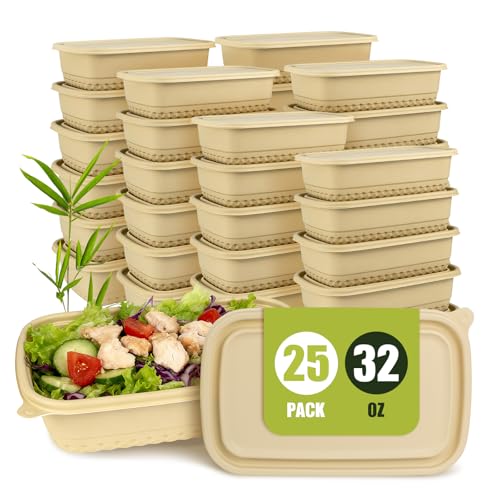
|
Bmboryxa 25Pack(50pcs) Meal Prep Containers Reusable, 32oz Bamboo-Powder Food Containers with... |
$23.99 |
Buy on Amazon |
Eco-Conscious Homeware Choices
Choosing eco-conscious homeware options not only benefits the environment but also adds a touch of style and sustainability to your living space. You can enhance your home’s aesthetic while supporting ethical practices by selecting brands like Boll & Branch, which offers a range of eco-friendly textiles made from GOTS Certified Organic Cotton produced in Fair Trade-certified facilities.
For those looking for sustainable furniture, Maiden Home provides made-to-order items, greatly reducing excess inventory and waste while ensuring quality craftsmanship.
Beyond textiles and furniture, consider the emphasis on innovative solutions within kitchen essentials and decor. For example, Jungle Culture’s zero-waste kitchen products, such as bamboo dish brushes, contribute to a sustainable kitchen, while Goodee curates ethically produced decor items from a variety of brands, reinforcing transparency in labor and ecological impact.
By integrating pieces from The Citizenry, you can celebrate handmade artistry that connects you to global artisans.
Ultimately, these eco-friendly homeware choices not only promote sustainability and social responsibility but also create a home environment that reflects your values, fostering a sense of belonging and community through shared ethics and style.
Frequently Asked Questions
How Do I Properly Clean Reusable Unpaper Towels?
To properly clean reusable unpaper towels, sort them based on the level of soilage before washing. For stain removal, pre-treat any visible stains with a natural remedy like vinegar.
Utilize a gentle wash cycle with mild detergent, avoiding fabric softeners that could diminish absorbency. Air drying is ideal; if using a dryer, select a low heat setting. Regular washing schedules help prevent bacteria buildup and extend the lifespan of your unpaper towels.
Are There Any Allergens in Organic Personal Care Products?
When you consider using organic personal care products, it’s vital to be aware of potential allergens. For instance, if you choose a cream with botanical extracts like chamomile, you might experience irritation due to sensitivities.
Allergens awareness is essential; ingredients such as parabens and fragrances can provoke allergic reactions. Always check labels for organic ingredients, opt for fragrance-free options, and conduct patch tests to determine possible allergies prior to widespread use.
What Materials Are Eco-Friendly Furniture Typically Made From?
Eco-friendly furniture is typically crafted from a variety of sustainable materials, such as reclaimed wood, bamboo, and FSC-certified wood, ensuring responsible sourcing. Additionally, you often find natural fibers like organic cotton and hemp used for upholstery, emphasizing natural treatments free from harmful chemicals.
These choices not only minimize environmental impact but also contribute to healthier living spaces, aligning with principles of sustainability and environmental stewardship essential for mindful consumers seeking eco-conscious options.
How Can I Dispose of Biodegradable Plant Pots?
How can you effectively dispose of biodegradable plant pots? You can utilize composting methods by adding these pots to your home compost pile or designated biodegradable waste facilities. Additionally, consider plant pot recycling through community programs that facilitate composting.
If you prefer, you can bury the pots in your garden, allowing them to naturally decompose and enrich the soil. Always guarantee you avoid placing them in regular trash systems, as that prolongs their degradation process.
Do Recycled Stationery Products Contain Any Harmful Chemicals?
Recycled stationery products often contain harmful additives such as bisphenol A (BPA), polyfluorinated compounds, and residue from inks and mineral oils, which pose potential health risks. These chemicals can migrate from the paper into direct contact items or food, leading to ingestion.
It’s essential to scrutinize product safety certifications when selecting recycled paper goods, ensuring they’re processed without hazardous substances, thereby safeguarding both environmental and personal health without compromising quality.
Conclusion
By integrating these top 10 eco-friendly products into your home, you not only contribute to a healthier environment but also promote sustainable living practices. For instance, studies indicate that adopting reusable items can reduce household waste by over 50%, greatly lowering your ecological footprint. Each choice, from energy-efficient appliances to biodegradable plant containers, plays an essential role in conserving resources and minimizing pollution, thereby fostering a more sustainable future while enhancing your living space’s functionality and aesthetic appeal.

